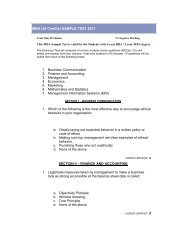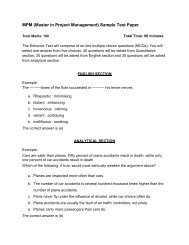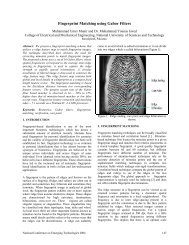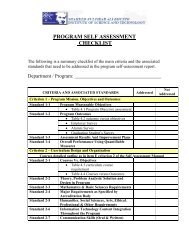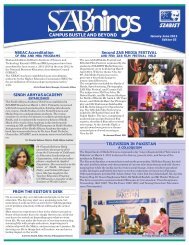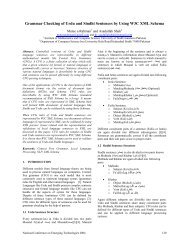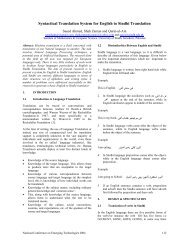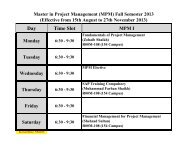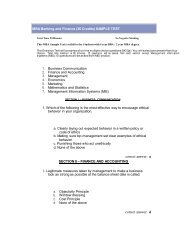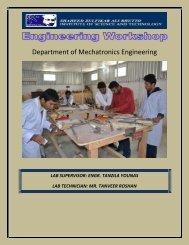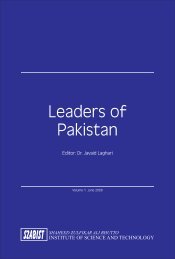Benazir Bhutto - SZABIST
Benazir Bhutto - SZABIST
Benazir Bhutto - SZABIST
You also want an ePaper? Increase the reach of your titles
YUMPU automatically turns print PDFs into web optimized ePapers that Google loves.
The Pakistan People's Party led in opinion polls, followed by Sharif's PML-N even before <strong>Bhutto</strong>'s<br />
assassination. Now the PPP is likely to benefit from a strong sympathy vote. The appointment of<br />
<strong>Bhutto</strong>'s 19-year old son, Bilawal <strong>Bhutto</strong> Zardari, and her husband, Asif Ali Zardari, as co-chairmen<br />
of the party will help keep the party unified. It will also help ride the sympathy wave.<br />
The government would appear ungracious and would lose votes if it goes too far in attacking the<br />
widower and the son who have just suffered a major personal loss. Pakistanis are an emotional people,<br />
and the national sentiment is now against Musharraf. Without major concessions to the opposition,<br />
Musharraf's legitimacy problems will continue to grow and a flawed election would only exacerbate<br />
his lack of credibility.<br />
In her death, as in her life, <strong>Benazir</strong> <strong>Bhutto</strong> has drawn attention to the need for building a moderate<br />
Muslim democracy in Pakistan that cares for its people and allows them to elect its leaders. The war<br />
against terrorism, she repeatedly argued, cannot be won without mobilizing the people of Pakistan<br />
against Islamist extremists, and bringing Pakistan's security services under civilian control.<br />
Husain Haqqani, a professor at Boston University, is Co-Chair of the Hudson Institute's Project on<br />
Islam and Democracy. He is the author of the Carnegie Endowment book "Pakistan Between Mosque<br />
and Military" and served as an adviser to Ms <strong>Bhutto</strong>. His wife, Farahnaz Ispahani, is a PPP<br />
candidate for parliamentary elections<br />
CNN<br />
January 8, 2008<br />
When I return to Pakistan<br />
Epilogue<br />
<strong>Benazir</strong> <strong>Bhutto</strong><br />
I am returning to Pakistan on Oct. 18 to bring change to my country. Pakistan's future viability,<br />
stability and security lie in empowering its people and building political institutions. My goal is to<br />
prove that the fundamental battle for the hearts and minds of a generation can be accomplished only<br />
under democracy.<br />
The central issue facing Pakistan is moderation vs. extremism. The resolution of this issue will affect<br />
the world, particularly South and Central Asia and all Muslim nations. Extremism can flourish only in<br />
an environment where basic governmental social responsibility for the welfare of the people is<br />
neglected. Political dictatorship and social hopelessness create the desperation that fuels religious<br />
extremism.<br />
Throughout Pakistan's 60-year history, weaving between dictatorship and democracy, from free<br />
elections to rigged elections to no elections, religious fundamentalists have never been a significant<br />
part of our political consciousness. We are inherently a centrist, moderate nation. Historically, the<br />
religious parties have not received more than 11 percent of the vote in national elections. The largest<br />
political party is mine, the Pakistan People's Party (PPP). Pakistan's political landscape has been<br />
molded primarily by the moderate PPP, which has demonstrated strong and continuous support from<br />
the rural masses and the urban elite.



